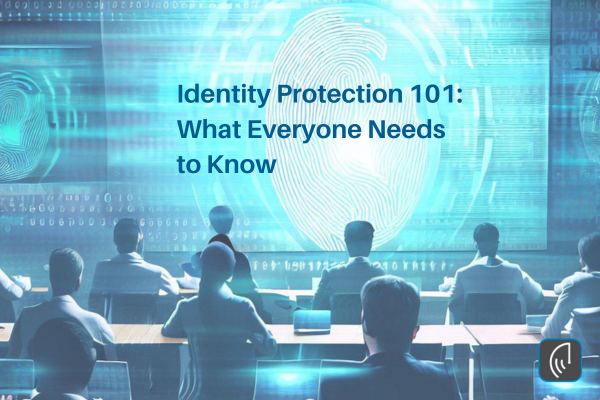
by Brian Thompson | Jul 5, 2023 | Identity Theft
Summertime is a great time to travel, but it’s also a prime time for identity theft. Vacationers are often more relaxed and less vigilant about their personal information, making them easy targets for thieves. Don’t forget to protect yourself from identity theft while you’re away. Identity theft can happen anywhere, including while you’re on vacation. But with a few simple precautions, you can enjoy your trip without worrying about your personal information falling into the wrong hands. Keep reading to learn more about protecting your identity while traveling and get tips for a secure vacation.
Secure your personal documents.
Before you leave for your vacation, make sure to secure your personal documents. This includes your passport, driver’s license, and any other identification cards you may be carrying. Keep these documents in a secure location, such as a hotel safe or a locked suitcase. Avoid carrying unnecessary documents with you, and if you need to bring them, make sure to keep them hidden and out of sight. By taking these precautions, you can minimize the risk of your personal information being stolen while you’re traveling.
Use a VPN when accessing public Wi-Fi.
When you’re traveling and need to connect to public Wi-Fi, it’s important to use a virtual private network (VPN) to protect your identity. Public Wi-Fi networks are often unsecured, making it easy for hackers to intercept your personal information. A VPN creates a secure connection between your device and the internet, encrypting your data and keeping it safe from prying eyes. By using a VPN, you can browse the internet, check your email, and access your online accounts without worrying about your personal information being stolen.
Be cautious with your credit cards.
When traveling, it’s important to be cautious with your credit cards to protect your identity. Avoid using your credit card for purchases at unsecured or unfamiliar locations, as these may be more susceptible to skimming devices or fraudulent activity. Instead, opt for cash or use a secure payment method such as a mobile wallet or chip-enabled card. Additionally, regularly monitor your credit card statements and report any suspicious activity immediately to your credit card company. By taking these precautions, you can enjoy your vacation without the worry of identity theft.
Avoid oversharing on social media.
While it may be tempting to share every detail of your vacation on social media, it’s important to exercise caution. Oversharing can make you a target for identity theft, as criminals can use the information you post to piece together your personal details. Avoid posting your exact travel dates, location, or any other sensitive information that could be used to compromise your identity. Instead, wait until you return home to share your vacation memories. By being mindful of what you share online, you can help protect your identity while traveling.
Keep an eye on your financial statements.
One of the most important steps in protecting your identity while traveling is to regularly monitor your financial statements. This includes checking your bank accounts, credit card statements, and any other financial accounts for any suspicious activity. Look for any unauthorized charges or withdrawals, as these could be signs of identity theft. If you notice anything out of the ordinary, contact your financial institution immediately to report the issue and take steps to protect your accounts. By staying vigilant and keeping an eye on your financial statements, you can help prevent identity theft and enjoy a secure vacation.
Clean out our wallet
Only take the forms of payment you need. If you have your purse or wallet stolen it is easier to remember what cards you have and quicker to limit your exposure.
Check bank accounts and credit cards:
be aware of charges and amounts you have on your accounts and cards. You can also set up alerts to let you know when certain spending or account limits are met.
Use hotel safes
Place anything that has personal information on it that you don’t need in the room safe. This way it isn’t on your person and reduces the risk of it being lost.
Protect your phone
it seems like we should not have to say this but if you do not have a password or biometrics on your phone, set it up before you go
Identity theft can happen anywhere, even on vacation. While there is no foolproof way to prevent it, following these tips can help you reduce your risk of identity theft while on vacation. However, it’s important to remember that there is no foolproof way to prevent it. If you think you’ve been a victim of identity theft, contact your bank, credit card companies, and the Federal Trade Commission (FTC) immediately.
Articles related to: Protecting Your Identity While Traveling: Tips for a Secure Vacation

by Brian Thompson | Jun 29, 2023 | Identity Theft
Your credit report plays a crucial role in your financial well-being, and errors on it can have a significant impact. If you’re concerned about inaccuracies on your credit report, this guide will provide you with step-by-step instructions on how to identify and dispute any errors. By taking control of your credit, you can ensure that your financial information is accurate and protect your overall financial health. Continue reading to learn what you need to know about errors on your credit report.
Understand the Importance of Checking Your Credit Report Regularly.
Checking your credit report regularly is essential for maintaining good financial health. Errors in your credit report can hurt your credit score and make it harder to get loans or credit cards. By reviewing your credit report on a regular basis, you can identify any inaccuracies or fraudulent activity and take the necessary steps to correct them. Don’t wait until you’re in a financial bind to check your credit report; make it a habit to review it at least once a year to ensure its accuracy and protect your financial future.
Review Your Credit Report for Errors and Inaccuracies.
One of the most important steps in maintaining good financial health is to regularly review your credit report for errors and inaccuracies. These errors have a negative impact on your credit score. Low credit scores make it difficult for you to obtain loans or credit cards with favorable interest rates. By taking the time to review your credit report, you can identify any mistakes or fraudulent activity. Then you can take necessary steps to dispute and correct them. Don’t wait until you’re in a financial bind to check your credit report – make it a habit to review it at least once a year to ensure its accuracy and protect your financial future.
Gather Supporting Documentation to Dispute Errors.
When disputing errors on your credit report, it’s important to gather supporting documentation to strengthen your case. This documentation can include things like bank statements, payment receipts, and correspondence with creditors. By providing evidence to support your dispute, you increase your chances of having the error corrected. Keep in mind that it’s important to keep copies of all documentation for your records and to send copies, not originals, when submitting your dispute. Taking the time to gather supporting documentation can make a significant difference in the outcome of your dispute and help you take control of your credit.
Submit a Dispute to the Credit Reporting Agency.
Once you have identified an error on your credit report, the next step is to submit a dispute to the credit reporting agency. This can be done online, by mail, or by phone, depending on the agency’s preferred method. When submitting your dispute, be sure to include all relevant information, such as the specific error you are disputing and any supporting documentation you have gathered. It’s important to be clear and concise in your dispute, and providing all details needed to investigate and correct the error. The credit reporting agency must investigate your dispute within 30 days and respond. If the agency determines that the information is indeed inaccurate, they must correct it on your credit report. Take the time to submit a dispute and provide supporting documentation to take control of your credit and ensure that your credit report is accurate and up-to-date.
Follow Up and Monitor the Resolution of Your Dispute.
After submitting a dispute to the credit reporting agency, it’s important to follow up and monitor the resolution of your dispute. Keep track of the date you submitted the dispute. Make a note to follow up after the designated timeframe for investigation has passed. If you haven’t received a response within the specified timeframe, reach out to the agency to inquire about the status of your dispute. It’s also a good idea to regularly check your credit report to see if the error has been corrected. You can request a free copy of your credit report from each of the three major credit reporting agencies once a year.By staying proactive and tracking your dispute, you can ensure that inaccuracies on your credit report are addressed and corrected quickly.
Summarized
Errors on your credit report can have a significant impact on your financial well-being. By following the steps outlined in this article, you can take control of your credit and ensure that your financial information is accurate.
- Review your credit report regularly. This is the most important step in preventing errors from occurring.
- Gather supporting documentation to dispute any errors you find.
- Submit a dispute to the credit reporting agency. Be clear and concise in your dispute, and provide all relevant information.
- Follow up and monitor the resolution of your dispute. Don’t let the issue go unresolved.
By taking these steps, you can protect your financial future and ensure that your credit report is accurate.
Here are some additional tips for disputing errors on your credit report:
- Be sure to dispute the error within 30 days of discovering it.
- If you are disputing a debt, be sure to provide proof that you have paid it in full.
- Disputing an account that you do not recognize? Be sure to provide proof that you are not the account holder.
- Be persistent in following up with the credit reporting agency.
By following these tips, you can increase your chances of having your error corrected. If you have any questions on what you need to know about errors on credit report contact us here: https://www.defend-id.com/contact
Stay safe and think before you click!
Related articles:

by Brian Thompson | Jun 20, 2023 | Identity Theft
As a mortgage borrower, identity theft protection is something that should be on your radar. With so much personal and financial information exchanged during the mortgage process, it’s important to know why identity theft protection is crucial for mortgage borrowers and to take steps to protect yourself from fraud and identity theft.
Here are some tips to help you secure your identity during the mortgage process and beyond.
- Work with a reputable lender or mortgage broker. Do your due diligence and research any professionals you’re considering working with. Read reviews, ask for referrals from friends and family, and check their credentials.
- Be careful about who you share your personal information with. When filling out mortgage applications or providing financial information, be careful about who you share it with. Never give out personal or financial information to someone who contacts you unsolicited. If you receive a call or email requesting this information, hang up or delete the message and contact your lender or broker directly to verify the request.
- Consider using a credit monitoring service. Consider using a credit monitoring service to keep tabs on your credit report and alert you to any suspicious activity. This can be especially helpful during the mortgage process, when your credit report may be pulled multiple times.
- Freeze your credit report. Another option to consider is freezing your credit report. This prevents anyone from opening new accounts in your name without your permission. Keep in mind that this can also make it more difficult for you to open new accounts, so weigh the pros and cons before taking this step.
- Monitor your financial accounts and credit reports regularly. Finally, be vigilant about monitoring your financial accounts and credit reports even after your mortgage has closed. Set up alerts for any activity on your accounts and regularly check your credit report for any errors or fraudulent activity.
- Ask your lender if they provide identity theft protection during the process and or after as a borrower benefit.
Identity theft is a serious problem, but it can be prevented. By taking these steps, you can help protect your identity and your financial future.
Here are some additional tips to help protect your identity:
- Use strong passwords and change them regularly.
- Be careful about what information you share online.
- Shred or destroy any documents that contain your personal information before you throw them away.
- Be aware of phishing scams.
- Report any suspicious activity to your lender or the credit bureaus immediately.
Protecting your identity may seem like a hassle, but it’s an important step to take to safeguard your finances and personal information. By taking these steps and staying vigilant, you can help prevent identity theft and enjoy a more secure financial future.
Did you know?
- Identity theft is a crime that affects millions of people every year.
- The average victim of identity theft spends 200 hours and $1,200 to recover their identity. FTC
- You can freeze your credit report for free at each of the three credit bureaus.
Related articles:

by Brian Thompson | Jun 14, 2023 | healthcare, Identity Theft
The Positive Impact of Employee Well-Being on Productivity and Performance
In today’s highly competitive business world, companies are searching for ways to boost productivity and performance. However, many employers overlook one crucial factor that can significantly impact their bottom line: employee well-being. Recent studies have shown that employees who feel mentally and physically healthy are more engaged, focused, and productive. Moreover, companies that invest in their employees’ well-being report higher job satisfaction and overall performance. From offering flexible work arrangements, mental health support, financial wellness, and protection programs to promoting physical activity and healthy eating habits, there are countless ways companies can prioritize employee well-being. In this article, we will explore the Positive Impact of Employee Well-Being and share practical tips for creating a workplace culture that supports and encourages a healthy lifestyle.
Understanding the link between employee well-being and productivity
Employee well-being and productivity are closely linked. When employees feel well, they are more likely to be engaged in their work, which lead to increased productivity. Studies have shown that employees who feel mentally and physically healthy are more productive than those who do not. One study found that employees who reported high levels of well-being were almost twice as productive as those who reported low levels of well-being.
Additionally, when employees feel well, they are more likely to be present at work and less likely to take time off due to illness. This leads to increased productivity and less disruption in the workplace.
Overall, there is a clear link between employee well-being and productivity. Prioritizing employee well-being creates a more productive and efficient workplace.
The impact of employee well-being on job satisfaction
Employee well-being also has a significant impact on job satisfaction. Employees are more likely to be satisfied with their job and overall work experience when they feel well, increasing job satisfaction and a higher level of commitment to the company.
Conversely, when employees feel unwell, they are more likely to be dissatisfied with their job and overall work experience, decreasing job satisfaction and increasing turnover.
How employee well-being affects employee Retention
Employee well-being is also closely linked to employee retention. When employees feel well, they are more likely to stay with their current employer. This can lead to increased retention rates and a more stable workforce.
Conversely, when employees do not feel well, they are more likely to look for work elsewhere. This can lead to decreased retention rates and a less stable workforce.
By prioritizing employee well-being, companies can create a more stable and committed workforce.
The Role of Managers in promoting employee Well-being
Managers play a critical role in promoting employee well-being. They are responsible for creating a work environment that supports and encourages employee well-being. This can include offering flexible work arrangements, providing mental health support, promoting physical activity and healthy eating habits, and creating a positive work culture.
Managers can also lead by example. When managers prioritize their well-being, they set an example for their employees to follow. This can create a culture of well-being within the workplace.
Strategies for improving employee well-being
There are countless strategies that companies can use to improve employee well-being. Here are a few examples:
- Offer flexible work arrangements, such as telecommuting or flexible hours.
- Provide mental health support, such as an Employee Assistance Program (EAP).
- Promote physical activity and healthy eating habits; by offering healthy snacks in the workplace or providing discounted gym memberships.
- Create a positive work culture
- Set up a financial wellness and protection program
- include identity theft protection!
Implementing these strategies will create a more supportive and healthy workplace.
The benefits of a workplace wellness program
One effective way to promote employee well-being is through a workplace wellness program. These programs offer a variety of health and wellness services to employees, such as health screenings, fitness classes, and stress management workshops.
Studies have shown that workplace wellness programs can have a significant impact on employee well-being. For example, one study found that employees who participated in a workplace wellness program reported lower levels of stress and higher levels of job satisfaction.
Additionally, workplace wellness programs can also have a positive impact on productivity and performance. By promoting employee well-being, companies can create a more engaged and productive workforce.
Case studies of companies that prioritize employee well-being
Many companies have successfully prioritized employee well-being and have seen positive results. For example, Google offers a wide range of health and wellness services to its employees, including on-site medical care, healthy meals, and fitness classes. As a result, Google has been able to attract and retain top talent and has been consistently ranked as one of the best places to work.
Another example is Patagonia, a clothing company that offers a variety of health and wellness services to its employees, such as on-site childcare and paid time off for volunteering. As a result, Patagonia has a highly committed workforce and has been able to maintain high retention rates.
Measuring the Success of employee well-being Initiatives
To ensure the success of employee well-being initiatives, it is important to measure their impact. This can be done through employee surveys, productivity metrics, and retention rates.
By measuring the success of employee well-being initiatives, companies can identify areas for improvement and make data-driven decisions about how to prioritize employee well-being.
Conclusion: Investing in employee well-being for long-term success
Employee well-being is a crucial factor in boosting productivity and performance. Prioritizing employee well-being creates a more engaged, productive, and committed workforce. This leads to increased retention rates, job satisfaction, and overall performance.
There are countless ways companies can prioritize employee well-being, such as offering flexible work arrangements, providing mental health support, promoting physical activity and healthy eating habits, and creating a positive work culture. Additionally, workplace wellness programs can be an effective way to promote employee well-being.
By measuring the success of employee well-being initiatives, companies can identify areas for improvement and make data-driven decisions about how to prioritize employee well-being. Overall, investing in in a program will have a Positive Impact of Employee Well-Being and is essential for long-term success in today’s competitive business world.
Related Articles:

by Brian Thompson | Jun 7, 2023 | Breach, Identity Theft
It’s more important than ever to protect your personal information from cybercriminals. With the rise of online shopping, social media, and cloud storage, our data is constantly shared and stored online. From credit card numbers to social security numbers, our identities are at risk of being stolen and used for fraud. That’s why it’s essential to have a solid understanding of identity protection. In this article, we’ll cover the basics of identity protection, including what it is, why it’s important, and some simple steps you can take to keep your information secure. Whether you’re a tech-savvy individual or someone new to the world of online security, this article is for you. So, grab a cup of coffee, and let’s dive into Identity Protection 101: What Everyone Needs to Know to Keep Their Information Secure!
Types of Identity Theft
There are several types of identity theft that you should be aware of. Understanding these types can help you identify if your information has been compromised and take steps to protect yourself.
The first type of identity theft is financial identity theft. This occurs when a cybercriminal uses your personal information to open new lines of credit or make purchases. They may also use your information to drain your bank account or take out loans in your name.
The second type of identity theft is medical identity theft. This occurs when a cybercriminal uses your personal information to receive medical treatment or prescription drugs. This can hurt your medical records and can even result in incorrect medical treatment.
The third type of identity theft is criminal identity theft. This occurs when a cybercriminal uses your personal information to commit a crime. This can lead to your name being associated with criminal activity, which can have serious consequences.
Signs of Identity Theft
There are several signs that your identity may have been stolen. These include:
– Unfamiliar charges on your credit card or bank account
– Calls from debt collectors for debts you don’t owe
– Notices from the IRS or other government agencies for taxes or benefits you didn’t apply for
– Medical bills for services you didn’t receive
– Denial of credit or loans due to a low credit score
If you notice any of these signs, it’s important to take action immediately to protect your identity. (https://consumer.ftc.gov/articles/what-know-about-identity-theft)
Steps to Protect Your Identity
There are several steps you can take to protect your identity and reduce your risk of identity theft.
The first step is to secure your passwords. Use strong, unique passwords for each of your online accounts and change them regularly. Avoid using the same password for multiple accounts, and don’t share your passwords with anyone.
The second step is to monitor your credit report. Check your credit report regularly for any unauthorized activity. You can get a free credit report from each of the three major credit bureaus once per year.
The third step is to be cautious when sharing your personal information online. Only share your personal information with reputable companies and websites. Be wary of phishing scams, which are emails or messages that try to trick you into giving away your personal information.
The fourth step is to use antivirus software and keep your software up to date. This can help protect your computer from malware and other cyber threats.
Identity Theft Prevention Tips
In addition to the steps above, several other identity theft prevention tips can help protect your identity.
First, be cautious when using public Wi-Fi. Avoid accessing sensitive information, such as your bank account, when using public Wi-Fi. Use a virtual private network (VPN) to encrypt your online activity.
Second, be cautious when sharing your personal information on social media. Avoid sharing sensitive information, such as your social security number or home address, on social media.
Third, be cautious when responding to unsolicited emails or phone calls. Cybercriminals often use these tactics to try to trick you into giving away your personal information.
Finally, check your bank and credit card statements regularly for any unauthorized activity. If you notice anything suspicious, report it to your bank or credit card issuer immediately.
Identity Protection Services
There are several identity protection services available to help you protect your identity. These services monitor your accounts for any signs of suspicious activity and can alert you if your information has been compromised.
Some identity protection services also offer credit monitoring, which can help you keep track of your credit score and stay on top of any changes to your credit report.
What to Do if Your Identity is Stolen
If your identity is stolen, it’s important to take action immediately. The first step is to contact your bank and credit card issuers to report the theft and request a freeze on your accounts.
You should also contact the three major credit bureaus to request a fraud alert on your credit report. This can help prevent any new lines of credit from being opened in your name.
Finally, file a report with the Federal Trade Commission (FTC) to report the identity theft. The FTC can provide you with a recovery plan and can help you take steps to restore your identity.
Identity Protection for Businesses
Identity protection isn’t just important for individuals – it’s also important for businesses. Businesses that handle sensitive customer information, such as credit card numbers and social security numbers, are at risk of cyber-attacks and identity theft.
To protect their customers’ information, businesses should implement strong data security measures, such as encryption and firewalls. They should also train their employees on how to identify and prevent cyber threats.
Finally, businesses should consider investing in identity protection services to monitor their accounts for any signs of suspicious activity and protect their employees – Here is a plan to implement.
Conclusion
Identity protection is essential in today’s digital age. By understanding the risks of identity theft and taking steps to protect your personal information, you can reduce your risk of financial loss and other negative consequences. Whether you’re an individual or a business owner, it’s important to take identity protection seriously and make it a priority. Please share this article…Identity Protection 101: What Everyone Needs to Know!
Related Articles:

by Brian Thompson | May 31, 2023 | Breach, healthcare, Identity Theft
The Importance of Identity Theft Protection
In today’s digital age, protecting your personal information has become more critical than ever before. With the rise of data breaches and cyber attacks, it’s become increasingly easy for criminals to steal your identity and cause damage to your financial and personal life. Identity theft can happen to anyone, regardless of age, gender, or social status. That’s why it’s crucial to take proactive measures to protect yourself from this growing threat. In this article, we’ll explore the importance of identity theft protection and ways to safeguard your personal information. From monitoring your credit report to using two-factor authentication, we’ll give you practical tips to help you stay safe online and offline. So, if you’re concerned about your personal information being at risk, read on to learn how you can protect yourself from identity theft.
Types of identity theft
Identity theft is a crime that occurs when someone uses your personal information without your consent to commit fraudulent activities, such as opening new credit accounts, taking out loans, or making unauthorized purchases. There are different types of identity theft, including financial identity theft, medical identity theft, and criminal identity theft.
Financial identity theft is the most common type of identity theft, where the thief uses your personal information to access your financial accounts and make fraudulent purchases or withdraw cash. Medical identity theft involves the thief using your medical information to receive medical treatment or purchase prescription drugs. Criminal identity theft occurs when the thief uses your identity to commit a crime, which can lead to you being wrongfully accused of the crime.
Common ways identity theft occurs
Identity theft can occur in different ways, including:
### Phishing scams
Phishing scams involve the thief using fake emails or websites to trick you into providing your personal information, such as your login credentials, social security number, or credit card details. These scams often appear to be legitimate, but they can lead to your personal information being stolen and used for fraudulent activities.
### Data breaches
Data breaches occur when a company’s database is hacked, and the thief gains access to your personal information, such as your name, address, social security number, and credit card details. This information can then be used to commit identity theft.
### Mail theft
Mail theft is a common way for thieves to steal personal information. They can steal your mail to obtain your credit card statements, bank statements, or other sensitive documents, which they can then use to commit identity theft.
The impact of identity theft
Identity theft can have a significant impact on your financial and personal life. It can damage your credit score, make it difficult to obtain credit or loans, and lead to financial losses. It can also affect your reputation and cause emotional distress, especially if you’re wrongfully accused of a crime.
How to protect yourself from identity theft
Protecting yourself from identity theft involves taking proactive measures to safeguard your personal information. Here are some tips to help you protect yourself from identity theft:
### Monitor your credit report
Monitoring your credit report regularly can help you detect any unauthorized activities, such as new credit accounts or loans opened in your name. You can obtain a free credit report once a year from each of the three major credit bureaus – Equifax, Experian, and TransUnion.
### Use two-factor authentication
Using two-factor authentication can help prevent unauthorized access to your online accounts. This involves using a password and a second form of verification, such as a fingerprint or a text message code, to access your accounts.
### Use strong passwords
Using strong passwords can help prevent hackers from accessing your accounts. A strong password should be at least eight characters long and contain a combination of letters, numbers, and special characters.
### Be cautious when sharing personal information
Be cautious when sharing your personal information online or in person. Only provide your personal information to trusted sources, and avoid sharing it on public Wi-Fi networks.
Identity theft protection services
Identity theft protection services can help you monitor and protect your personal information from identity theft. These services can provide you with alerts when there’s suspicious activity on your accounts, monitor your credit report, and offer identity restoration services if you become a victim of identity theft.
Tips for selecting an identity theft protection service
When selecting an identity theft protection service, consider the following factors:
### Features
Look for a service that offers comprehensive monitoring and protection features, such as credit monitoring, identity restoration, and fraud alerts.
### Cost
Consider the cost of the service and whether it fits within your budget. Some services offer free trials or low-cost plans, while others can be more expensive.
### Reputation
Research the reputation of the service provider to ensure they’re trustworthy and have a good track record of protecting their customers’ personal information.
What to do if you become a victim of identity theft
If you become a victim of identity theft, it’s important to act quickly to minimize the damage. Here are some steps you can take:
### Contact your financial institutions
Contact your bank, credit card companies, and other financial institutions to report the fraud and cancel any unauthorized transactions or accounts.
### File a report with the FTC
File a report with the Federal Trade Commission (FTC) to report the identity theft and create a recovery plan.
### Contact the credit bureaus
Contact the three major credit bureaus – Equifax, Experian, and TransUnion – to place a fraud alert on your credit report and freeze your credit.
### Work with an identity theft restoration service
Consider working with an identity theft restoration service to help you restore your identity and clear your name.
Identity theft prevention best practices
Here are some best practices to help prevent identity theft:
### Shred sensitive documents
Shred any sensitive documents that contain personal information before disposing of them.
### Protect your mail
Protect your mail by using a secure mailbox or a post office box.
### Keep your software up to date
Keep your software up to date with the latest security patches to prevent hackers from accessing your computer or mobile device.
### Use a VPN
Use a virtual private network (VPN) to encrypt your internet connection and protect your personal information from hackers.
Conclusion
Protecting your personal information from identity theft is crucial in today’s digital age. By taking proactive measures to safeguard your personal information, such as monitoring your credit report, using two-factor authentication, and using strong passwords, you can minimize the risk of becoming a victim of identity theft. Consider working with an identity theft protection service to provide additional monitoring and protection features. If you become a victim of identity theft, act quickly to minimize the damage and work with an identity theft restoration service to help you restore your identity and clear your name.
Is Your Personal Information at Risk? The Importance of Identity Theft Protection – Related articles:





